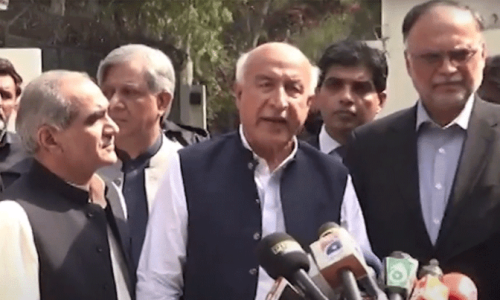DEALING with militancy might be easy, but dealing with militant groups is not. At least this seems true in Pakistan. The country has achieved significant successes in its war against terrorism, but is still confused on how to deal with banned militant groups.
The recent notification issued by the Pakistan Electronic Media Regulatory Authority (Pemra), banning the media coverage of proscribed organisations, has triggered a controversy within different government departments. While this controversy has exposed the policy-level ambiguity about the status of different extremist organisations, it has also provided groups such as Jamaatud Dawa (JuD) and its charity wing an opportunity to once again dismiss the government action as part of the Western and Indian campaign against them.
At the same time, the Pemra notice has also exposed the differences between the information and interior ministries over the implementation of the National Action Plan. Just a few hours after the issuance of the notice, the federal interior ministry came up with a response; later it was known that the notice was issued on the instructions of the information ministry. The information ministry appeared to know little about militant organisations in Pakistan, as apparently no official list of banned groups was provided to it. The status of the list of banned organisations attached with the Pemra notification has become dubious after the rebuttal from the interior ministry.
A reintegration framework is needed to neutralise the violent tendencies among militant groups.
In August this year, Federal Interior Minister Nisar Ali Khan had proudly announced that a comprehensive list of 62 proscribed organisations had been compiled. But very little is known about these banned outfits as no official list is available. The National Counter-Terrorism Authority, which is supposed to disseminate such information, was also reluctant to release the list of banned organisations. It is interesting to note that Nacta’s website was shut down after a list of banned organisations posted on it had generated controversy. It was claimed that the list was not official and since then the website of the counterterrorism body has been ‘under construction’.
The media reports claim that the Pemra notification was in line with the joint communiqué issued by Prime Minister Nawaz Sharif and US President Barack Obama during the former’s recent trip to Washington D.C., and obligations under UN Resolution 1267. If this is the case, why did the interior ministry issue a rebuttal?
Notwithstanding bureaucratic excuses for failure to check the activities of militant groups, let’s take a candid and broader view of the issue. Are the extremist groups needed in Pakistan to balance the extremist and ultranationalist groups in India? Is a Pakistani Shiv Sena necessary to respond to anti-Pakistan rhetoric in India? And above all, do we need competition with India in the field of extremism as well?
Pakistan has made significant gains against terrorists, while the state and society are in the process of finding solutions to the growing extremist tendencies in the country. We cannot afford to derail our journey to a more moderate mindset — the journey has come after long sufferings and sacrifices — just to remain ‘relevant’ to India’s so-called start of the slide on the slope of extremism.
It is also important to note that in Pakistan many conventional militant groups have taken refuge behind anti-Indian rhetoric. This is happening at a time when mainstream political and even leading religious parties see no political and public advantage in encouraging active anti-India propaganda. This is a positive change in Pakistan, but it also provides the opportunity to groups such as the JuD to exploit the situation in their favour. But the militant credentials of these groups are a major obstacle in the way of achieving legitimacy and public support.
Would it not be enough for the common man in Pakistan to take pride in not indulging in negative competition with India?
Another issue in dealing with the banned groups may be the lack of a strategy on part of the government. The argument that the militant groups were nurtured in the country for many decades and reversing the phenomenon will take time could be valid only if the government was taking some initiatives to control them. It’s hard to deny the charity role of certain groups — mainly the JuD — but the government has not taken any steps for their proper reintegration.
To address this problem, a multipronged reintegration framework is needed in order to neutralise the existing violent extremist tendencies among the conventional militant groups and remove them from the terrorism landscape. Under this scheme, the government can offer amnesty to banned groups that agree to give an undertaking that they will obey the Constitution of Pakistan, quit and denounce all kinds of violence and militant activities, shun all criminal activities including spreading hate messages, and most importantly will register themselves with the relevant authorities/departments.
A separate mechanism for their registration and monitoring can be evolved at the federal or provincial level. The registration of such militant groups should not be a problem for the interior ministry, as it has now acquired sufficient relevant experience through registering the international non-governmental organisations.
The JuD’s case is complex as it claims that it does not have any direct link with the banned Lashkar-e-Taiba. But the Pemra notification said that the JuD and Falah-i-Insaniyat Foundation are also reincarnations of the banned LeT. However, it is the responsibility of the JuD leadership to prove that it does not have any links to terrorism and terrorist groups. A public declaration should be acceptable for the people and the international community only when its publications stop projecting the activities of LeT and glorifying militancy. The JuD leadership should realise that the world is neither blind nor deaf.
The writer is a security analyst.
Published in Dawn, November 8th, 2015
On a mobile phone? Get the Dawn Mobile App: Apple Store | Google Play












































